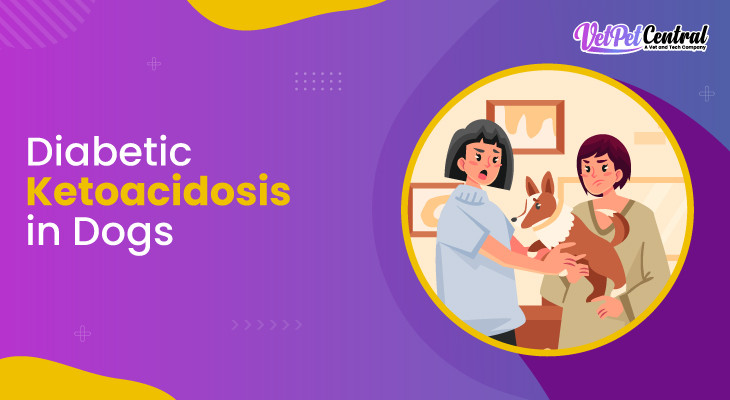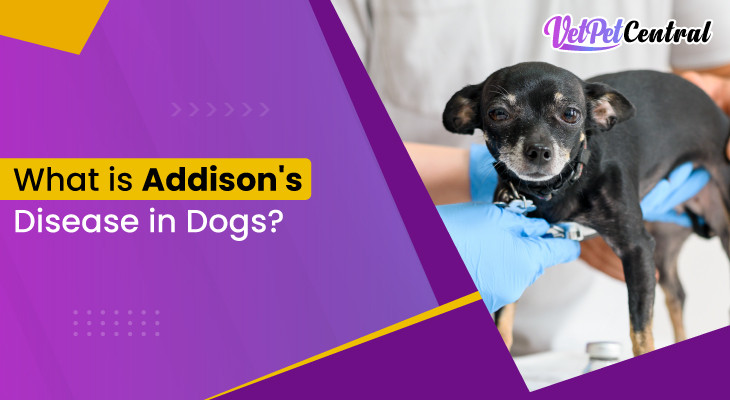Diabetic Ketoacidosis in Dogs: Symptoms, Treatment, Cost, and Prevention
 May 22, 2025
May 22, 2025

Diabetic ketoacidosis in dogs (DKA) is a serious and life-threatening complication of diabetes mellitus. If left untreated, this condition can quickly become fatal. However, early diagnosis and proper treatment can significantly improve your dog's chances of survival and long-term health.
In this guide, we’ll walk you through the symptoms, diagnosis, treatment, survival rate, cost, and prevention of ketoacidosis in dogs. We’ll also provide tips on managing this condition at home and when to seek emergency care.
What is Diabetic Ketoacidosis in Dogs?
Ketoacidosis in dogs occurs when there’s not enough insulin in the body to help convert glucose (sugar) into energy. Instead, the body starts breaking down fat for energy, which produces ketones as a byproduct. High levels of ketones can make the blood dangerously acidic—this is called diabetic ketoacidosis (DKA).
This condition is a medical emergency and requires immediate veterinary attention.
What Causes DKA in Dogs?
Dogs with diabetes mellitus are at high risk of developing DKA. Common causes include:
- Missed or incorrect insulin doses
- Infections or other illnesses (like pancreatitis or Cushing's disease)
- Stress or trauma
- Surgery or anesthesia
- Underlying medical conditions affecting glucose regulation
Here are the most common signs of diabetic ketoacidosis in dogs:
- Increased thirst and urination
- Weight loss
- Lethargy
- Vomiting
- Labored breathing
- Sweet-smelling breath
- Confusion or disorientation
- Seizures
- Coma
Important: These symptoms range in severity. Immediate vet consultation is essential once you notice any combination of these signs.
How is DKA Diagnosed in Dogs?
Veterinarians diagnose diabetic ketoacidosis through a combination of physical exams and lab tests:
Physical Signs:
- Lethargy
- Weakness
- Dehydration
- Fruity breath odor
Diagnostic Tests:
- Blood test
- Urinalysis
- Biochemistry profile
- Ultrasound or imaging
Dog DKA Treatment Options
If your dog is diagnosed with DKA, prompt treatment is crucial. Severe cases typically require hospitalization:
- Fluid therapy
- Electrolyte replacement
- Insulin therapy
- Antibiotics or medications
- Monitoring and supportive care
For mild DKA cases, outpatient treatment might be possible, but only under the direct supervision of your vet.
Cost of DKA Treatment in Dogs
The cost of treating diabetic ketoacidosis in dogs can vary widely:
- Mild cases (outpatient): $500–$1,000
- Moderate to severe cases (hospitalization): $1,500–$4,000+
- Ongoing insulin therapy and follow-ups: $50–$200/month
Dog DKA Survival Rate and Life Expectancy
Survival rate for dogs with DKA depends on how early the condition is diagnosed and treated.
- With early diagnosis and aggressive treatment, the survival rate is around 70–80%.
- Dogs that recover can live 1–2 years or more.
- Delayed treatment may lead to coma or death within days.
Key preventive measures include:
- Give insulin exactly as prescribed
- Monitor your dog’s blood sugar daily
- Provide a consistent, balanced diet
- Schedule regular check-ups with your vet
- Keep stress levels low
- Stay alert to changes in behavior
- Use telemedicine services when needed
Tip: Invest in a home glucose monitor and log your pet’s readings daily.
Managing Your Dog After a DKA Episode
After recovery, ongoing care is essential. Follow your vet’s instructions for insulin and diet. Track your dog’s glucose and ketone levels. Stick to a daily routine and report any changes to your vet. Use online vet services if in-person visits aren't possible
Key Takeaways
- Diabetic ketoacidosis in dogs is life-threatening
- Caused by a lack of insulin, leading to toxic ketone buildup
- Early diagnosis and treatment are crucial
- Prevention through proper diabetes management
- Treatment costs vary, but are life-saving
Dog DKA can be fatal if ignored—but with the right knowledge, tools, and support, your dog can recover and live a happy life. Need help managing your dog’s condition? Try VetPet Central to consult licensed vets online.
FAQs
Q1: What is the cost of DKA treatment in dogs?
A: $500 to $4,000+ depending on severity.
Q2: Can a dog survive diabetic ketoacidosis?
A: Yes, with early treatment most dogs survive and can live 1–2 more years.
Q3: How long can a dog live after a DKA episodes
A: With proper management, dogs can live multiple years.
Q4: Is DKA painful for dogs?
A: Dogs feel very sick; immediate care reduces pain and suffering.
Q5: Can DKA in dogs be prevented?
A: Yes, through insulin therapy, diet control, and blood sugar monitoring.




